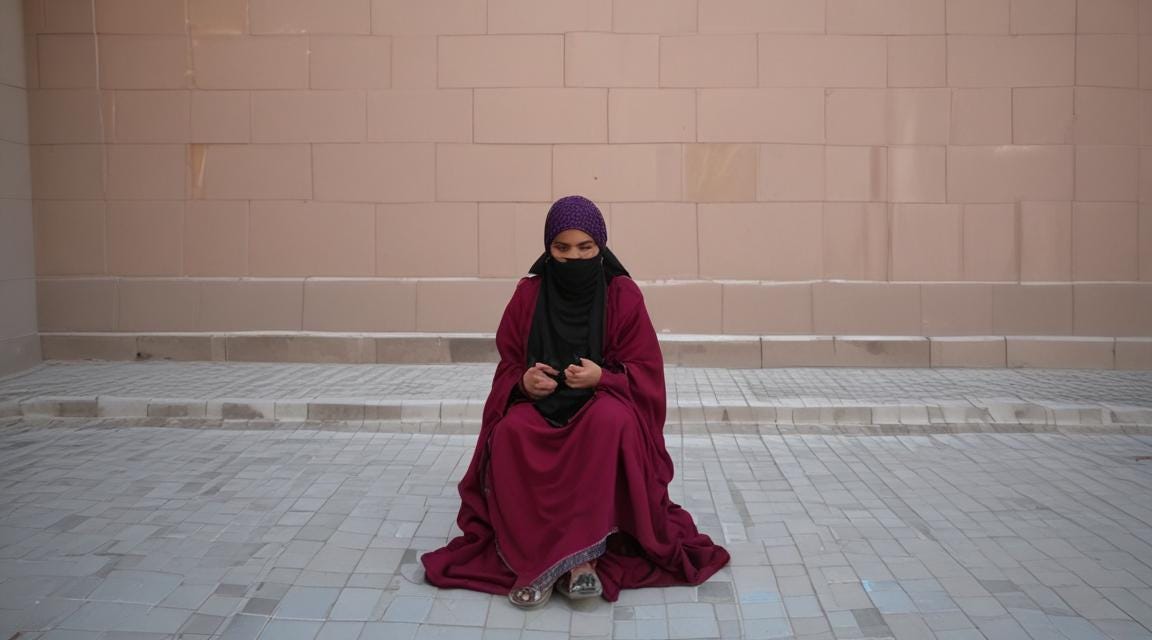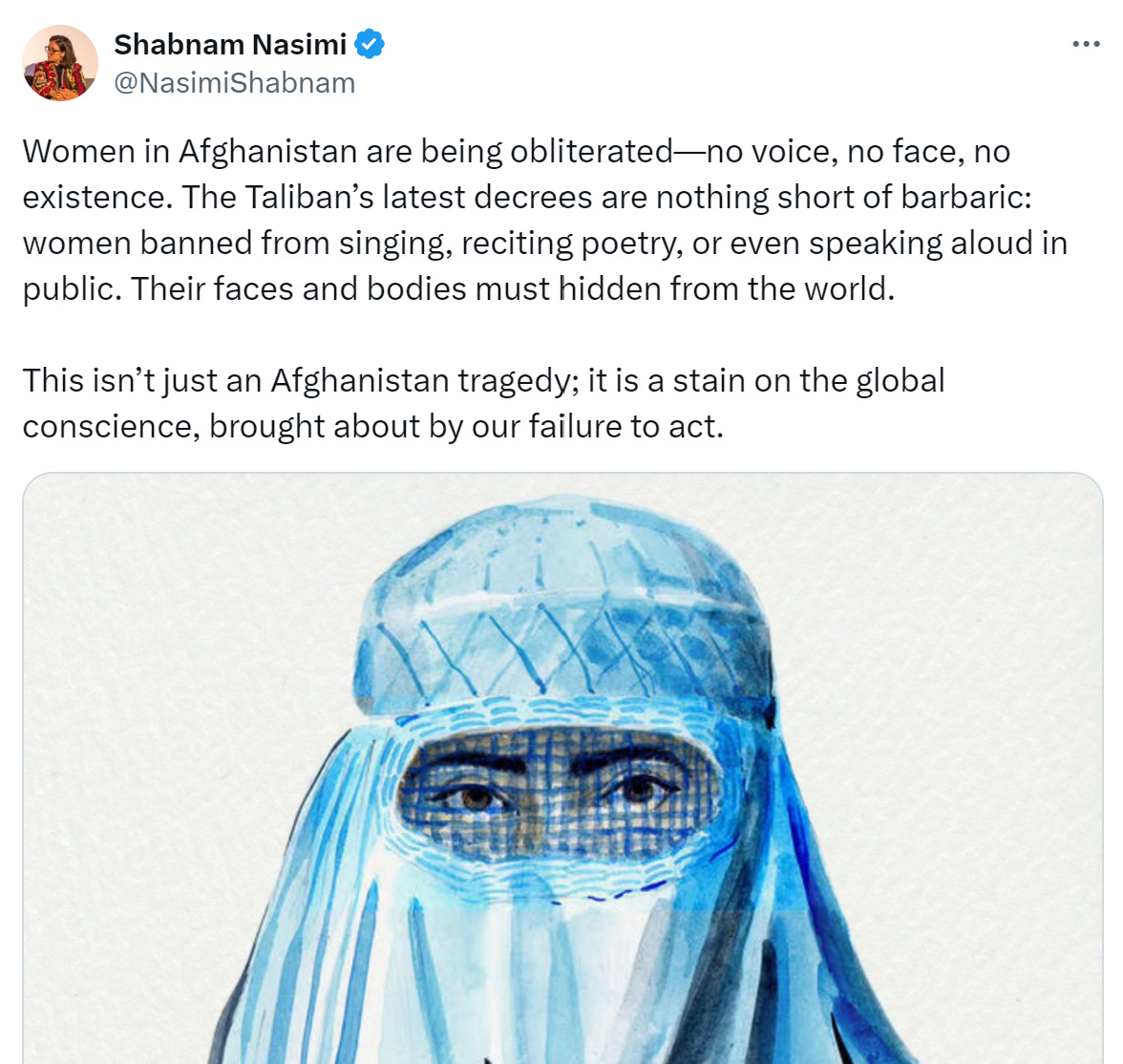Afghanistan's Grim Silence: Taliban's Latest Clampdown on Women's Rights
How the Taliban's Ban on Women's Public Voices Marks a Dark Turn for Afghan Society and International Relations
The Taliban's resurgence in Afghanistan has been synonymous with the erosion of women's rights, culminating in the latest draconian measures that essentially silence women in the public sphere. The most recent edicts—banning Afghan women from speaking in public and mandating the full covering of their faces—represent not just a human rights crisis but also a severe blow to Afghanistan's socio-economic fabric and its relations with the international community.
The Taliban's ban on women's voices in public is not just an assault on women's rights but an attack on the very soul of Afghanistan. As Afghan women are silenced, the country risks losing the vital contributions that half of its population can offer. The international community must recognize that this is not just an Afghan issue but a global one.
New Reality: Women Silenced and Erased
Taliban further tightened its grip on Afghan women by implementing a strict new set of vice and virtue laws under the Islamist regime. The laws issued on August 21, Wednesday after they were approved by supreme leader Hibatullah Akhundzada. The new set of laws cover aspects of everyday life like public transportation, music, shaving and celebrations.
Significantly, among the new rules, Article 13 relates to women: It says it is mandatory for a woman to veil her body at all times in public and that a face covering is essential to avoid temptation and tempting others. Clothing should not be thin, tight or short. Under the new set of laws, women are also obliged to cover themselves in front of non-Muslim males and females to avoid being corrupted. A woman’s voice is deemed intimate and so should not be heard singing, reciting, or reading aloud in public. It is forbidden for women to look at men they are not related to by blood or marriage and vice versa.
These laws are not merely about enforcing conservative dress codes but is an explicit effort to erase women's presence and voices from the public sphere. The move has been met with widespread international condemnation, yet the Taliban remains defiant, rejecting UN concerns and international criticism.
It marks a grim escalation in the Taliban's ongoing campaign against women's rights, a stark departure from the progress made in the two decades before their return to power. Afghan women had once been active participants in public life, contributing significantly to the nation's political, economic, and social landscapes. Now, these gains are being systematically dismantled, as Afghan women face increasing restrictions that strip them of their agency and humanity.
International Outcry and the Taliban's Defiance
The global response to the Taliban's latest edicts has been one of unanimous condemnation. The United Nations has called these laws “distressing vision for Afghanistan’s future, where moral inspectors have discretionary powers to threaten and detain anyone based on broad and sometimes vague lists of infractions" emphasizing that they violate international human rights standards.
“It extends the already intolerable restrictions on the rights of Afghan women and girls, with even the sound of a female voice outside the home apparently deemed a moral violation,” said Roza Otunbayeva, the Special Representative of the Secretary-General and head of the United Nations Assistance Mission in Afghanistan (UNAMA).
However, the Taliban's response has been dismissive, framing these actions as necessary to uphold their interpretation of Islamic law and cultural norms. “Inshallah we assure you that this Islamic law will be of great help in the promotion of virtue and the elimination of vice,” said ministry spokesman Maulvi Abdul Ghafar Farooq.
Shabnam Nasimi, Former Policy Advisor to Minister for Afghan Resettlement & Minister for Refugees and a prominent advocate for Afghan women, took to social media to highlight the dire consequences of these policies. In a tweet, she expressed that these measures are not just oppressive, but women in Afghanistan are being obliterated.
Nasimi’s perspective is echoed by many activists who view the Taliban’s actions as an attempt to revert Afghanistan to the dark days of their previous rule, where women were almost entirely excluded from public life.
Socio-Economic Implications
The implications of these restrictions are profound and far-reaching. Barring women from speaking in public or showing their faces effectively eliminates them from participating in any form of public discourse, be it in media, education, or even basic social interactions. Moreover, the psychological impact on Afghan women is devastating. Human rights organizations have long documented the trauma that Afghan women endure under such oppressive regimes where women are forced to live in a state of constant fear and repression.
Broader Impact
These policies also have a broader impact on Afghanistan’s international relations. The Taliban's refusal to adhere to international norms further isolates Afghanistan from the global community. This isolation is not just diplomatic but extends to economic sanctions and the withdrawal of international aid, both of which are crucial for a country on the brink of economic collapse.
The international community's leverage over the Taliban is limited, but there are calls for more robust actions. Some suggest that the United Nations and other international bodies should impose stricter sanctions, while others advocate for more direct interventions to support Afghan women. However, the effectiveness of such measures remains uncertain, particularly given the Taliban's history of resisting external pressures.
Call for Global Solidarity
The situation in Afghanistan serves as a stark reminder of the fragility of women's rights and the importance of international solidarity. While the Taliban's actions are driven by internal motives, the global community has a moral obligation to stand against such blatant violations of human rights.
Human rights and women groups continue to call for sustained international pressure on the Taliban, emphasizing that the world must not turn a blind eye to the suffering of Afghan women. These calls for action are echoed by activists worldwide, who demand that governments and international institutions do more to support Afghan women, whether through diplomatic channels, economic measures, or humanitarian aid. Meanwhile the silence of Afghan women speaks volumes, and it is incumbent upon the world to listen—and to act.






